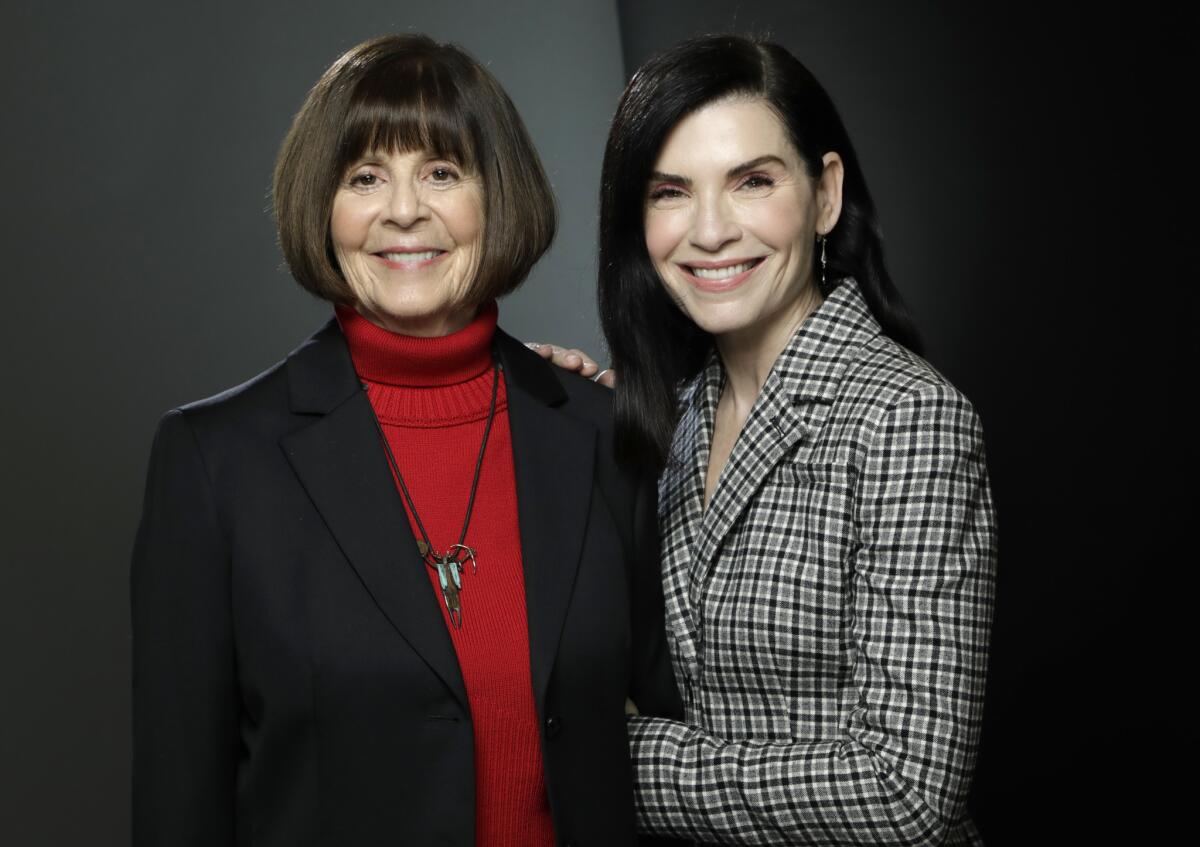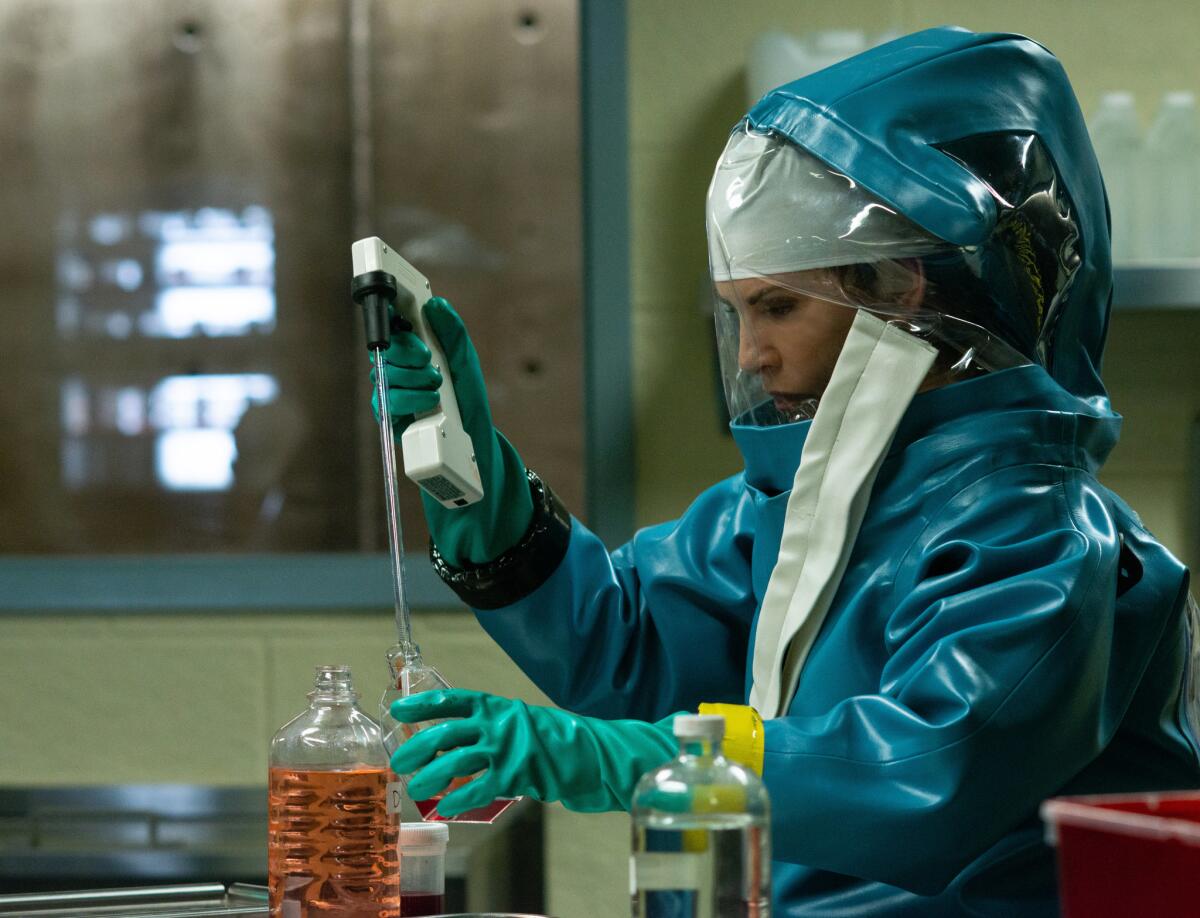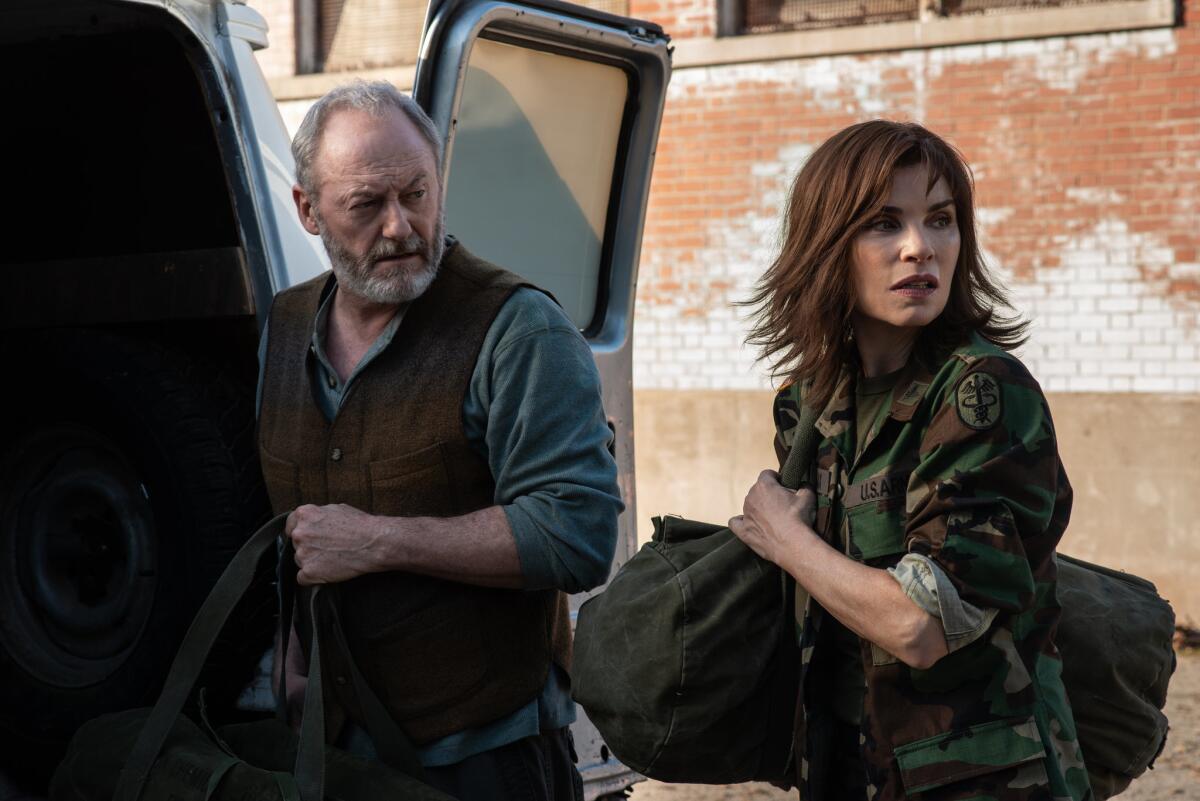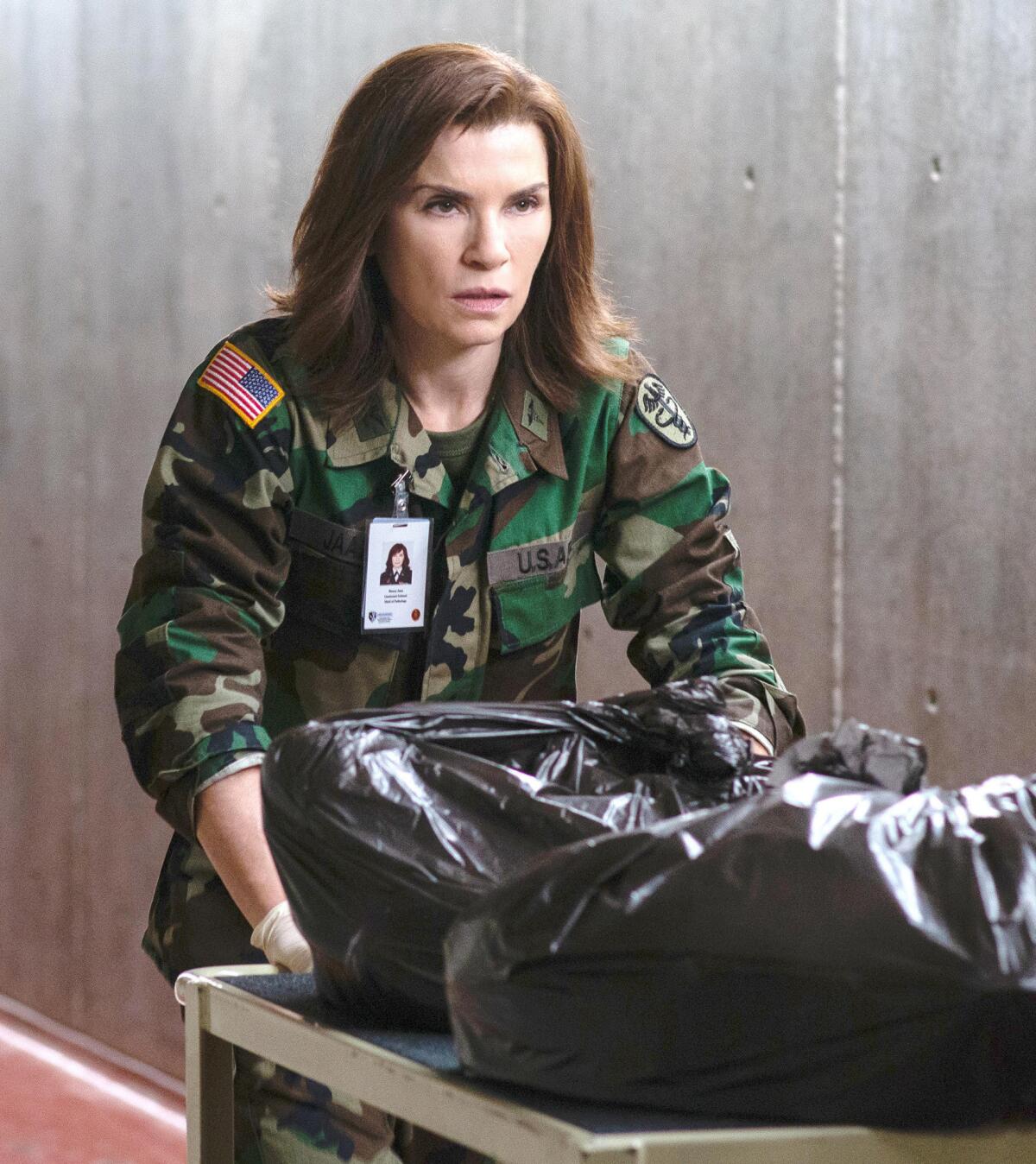‘The Hot Zone’s’ Julianna Margulies takes on a deadly virus in National Geographic miniseries

- Share via
Julianna Margulies was terrified.
The actress, who has built a roster of formidable characters in her versatile career, including the dedicated nurse Carol Hathaway in “ER” and courageous attorney Alicia Florrick in “The Good Wife,” felt out of control at one point in taking on the role of Lt. Col. Nancy Jaax, based on the real-life, no-nonsense scientist at the center of a life-threatening battle in National Geographic’s miniseries “The Hot Zone.”
In the miniseries, which centers on the outbreak of the deadly Ebola virus on U.S. soil, Margulies donned a 50-pound hazmat suit for a critical scene in which her character takes a cadet into a Biosafety Level 4 laboratory, the most complex and dangerous biohazard level.
Although the actress channels Jaax’s firm authority in the scene, she said she felt just the opposite during filming.
“I’m embarrassed to say it, but I actually panicked,” Margulies said in a recent interview at a West Los Angeles hotel as she sat alongside Jaax. “The suits were really scary. When they zipped me in, I felt alienated from the planet.”
Interjected Jaax: “You kind of are.”
“I don’t like not having control of my physical body,” Margulies said. “When they zipped me, all I could hear was the whir of the fans in the suit that are there to cool you down. It was very scary.”

ALSO: Julianna Margulies dives into real-life biohazard horror story ‘The Hot Zone’ »
Viewers tuning into “The Hot Zone,” which starts May 27 and runs for three consecutive nights, are likely to experience several other frightening moments during the project, which is based on the bestselling nonfiction book by Richard Preston. The story revolves around a scientific facility near Washington, D.C., where in 1989 the deadly Ebola virus made its first known appearance in the U.S. Jaax led the discovery and eventual containment of the filovirus, which at the time had a fatality rate of up to 90%.
“It’s a thriller until you realize it’s real, and then it becomes a horror movie,” Margulies said.
Also starring in the miniseries is Noah Emmerich (“The Americans”), Topher Grace (“That ’70s Show,” “BlacKkKlansman”), Liam Cunningham (Davos Seaworth in “Game of Thrones”) and James D’Arcy (“Homeland,” “Agent Carter”).
Executive producers Brian Peterson and Kelly Souders said that while they want viewers to be entertained by “The Hot Zone,” they also have a larger objective.
“We really want to highlight with families and kids the idea that scientists are heroes as much, if not more, than other people in society,” Peterson said. “We want to draw attention to these amazing selfless acts these scientists do that protect millions, and even billions of people.”
Added Souders: “Hopefully it will make people aware of the massive looming threats out there that we tend to ignore in our daily lives.”
Casting Margulies as Jaax was an important element of making “The Hot Zone” effective, they said.
“Nancy is a soldier, and we needed someone who could show strength and confidence and command,” Souders said. “Nancy is also a mother to two kids, so we also wanted to show that lens. Juliana is an amazing actress, and people love to watch her.”

Margulies and Jaxx displayed a palpable chemistry as they discussed the project, saying they hoped viewers would be both thrilled and educated by the miniseries.
Nancy, what was it like for you to go back and experience this?
Jaax: It brings a lot back. What made it so [different] was that this had never happened before in the United States. There were no protocols. There were lots of people who worked really hard, and we pulled it off.
Do you remember how scary it was? What you went through looks so harrowing.
Jaax: People always ask me, “Were you scared? Were you horrified?” But we were excited. That’s our job, and that’s what we love to do. You could have a 30-year career and not find a new virus. It’s pretty cool. Obviously you don’t want anyone to get sick, but we were excited doing our job.
Julianna, what drew you to the project and playing Nancy?
Margulies: It was a plethora of things. They sent me the first four scripts and I couldn’t put them down. I realized how ignorant I was of this whole world. I didn’t read about it. I didn’t know about it. I was in college. I had heard about Ebola in Africa, but I never dove deep into how dangerous it was, and that it’s a global issue not a singular nation’s issue. I was amazed that something like this happened on U.S. soil and that no one knew about it. Also, the fight was led by a woman. That was remarkable to me.
Jaax: It was a lot of fun. It really was.
Margulies: Without sounding judgmental, what I don’t understand are these science deniers who have come to power and think they know better than the professionals. It doesn’t make sense. Not when we have these capable and professional scientists giving us the answers. If I can do anything to help their cause, I want to do that. If some of the 4 million people who watched “The Good Wife” watch this and we can reach one who will wake up and say, “What’s going on? What can I do to help?” I will be pleased.

Nancy, what do you think of how the miniseries handled the details?
Jaax: The scene where Julianna is taking the cadet into biohazard level 4, that’s exactly what we do and Julianna did a tremendously good job. That’s how you teach it — you can’t give people a piece of paper. They have to see what you do. She did an awesome job.
Margulies: It was daunting. These scientists speak a different language, and I don’t know that language.
What was it like to meet Nancy after you learned you would play her?
Margulies: We just met about a week ago! We only talked on the phone for 20 minutes. But we texted.
Jaax: And a few emails.
Margulies: I wanted her blessing. I didn’t want the scientific community to hate our show, to say, “Oh, that would never happen.” I asked her what it was like, things like what she wore. Nancy never wore a skirt. The labs are so cold you can’t do anything in a skirt.
Jaax: Everyone in my family said she got the character spot-on. She didn’t show any awkwardness. When your kids watch and they say about Julianna, “That’s you, mom. You’re a badass,” that feels good.
Julianna, you played a nurse on “ER” and you had a lot of medical and technical dialogue. How was playing a scientist different?
Margulies: It was very different. On “ER,” I was dealing with human beings. I wasn’t dealing with tissue on a slab of glass. I wasn’t in a lab in a hazmat suit. I don’t understand pathogens. On “ER,” it was easier to navigate. Here, I felt completely and utterly at sea until I learned the monologues. And there were a lot of monologues.
I know you both want viewers to be thrilled and entertained, but is there a bigger message?
Jaax: I hope that viewers understand how complicated and dangerous this work is, and how we really need people who can deal with it. This research is critically important. We send soldiers all over the world and they’re exposed to this stuff, so it’s our job to see they don’t get sick from it. Some people use these agents for harm. They can be used for bioweapons. People need to be aware of that.
Margulies: My first hope is that people realize that this really happened. My second hope is that these researchers get the kind of financial support they really need. And this is also a great message for girls, to see that women were on the front lines for this.
More to Read
The complete guide to home viewing
Get Screen Gab for everything about the TV shows and streaming movies everyone’s talking about.
You may occasionally receive promotional content from the Los Angeles Times.







